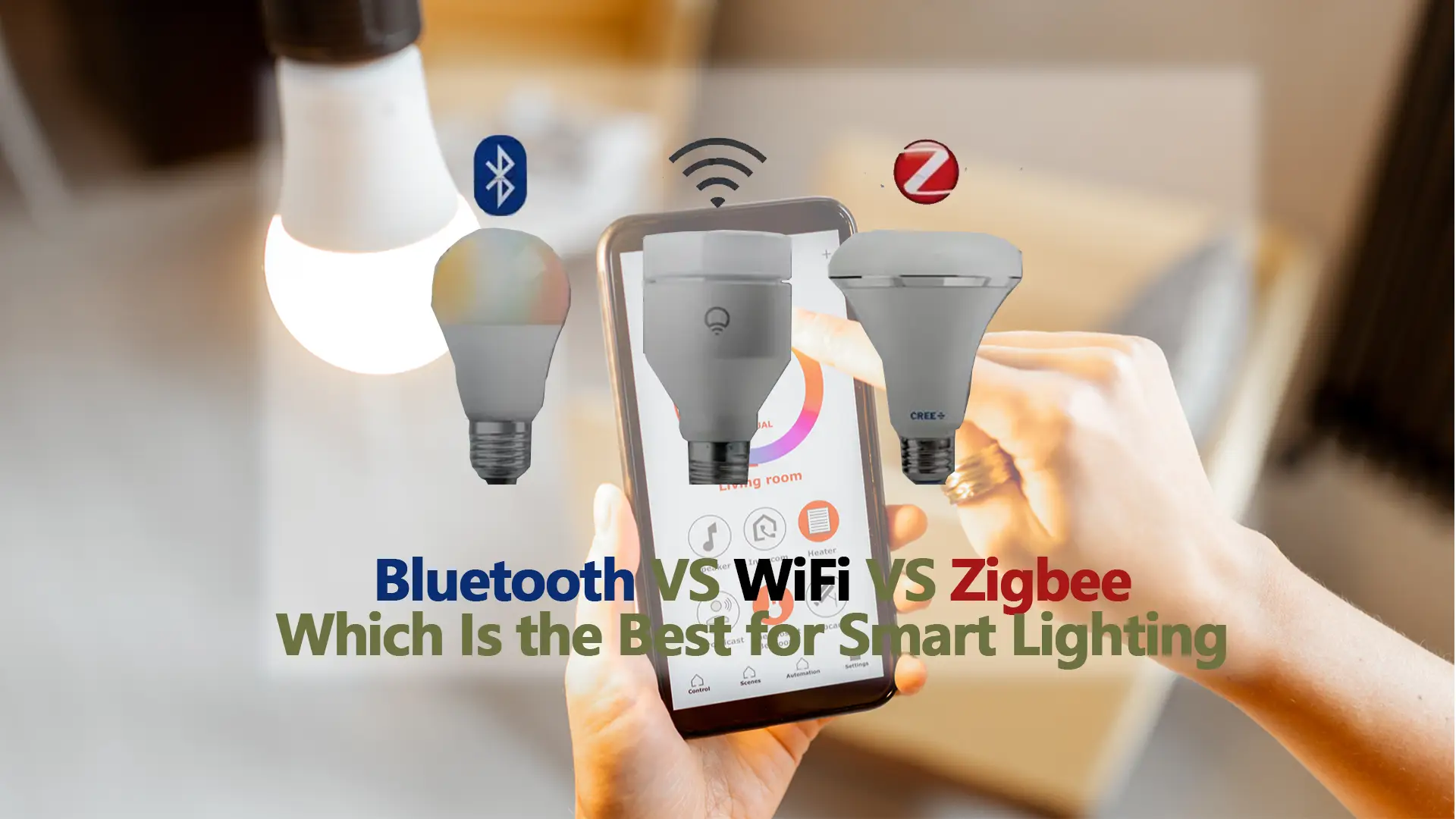In den vergangenen Jahren, as wireless communication technology and the Internet of Things continuously develop and process, the number of smart home products has increased exponentially. Derzeit, there are three major smart lighting standards on the market, nämlich Bluetooth, WIFI, and Zigbee. The smart lighting solutions based on these three protocols include three types: WIFI smart light, Bluetooth Mesh smart light, and Zigbee smart light. This article will take you to learn about the difference, advantages and disadvantages of each protocol to help you make a more informed choice for your smart home lighting.
What IS the Difference? Bluetooth vs. WLAN vs. Zigbee
Zigbee
Zigbee is a low-power, low-cost, low-bandwidth open wireless mesh network technology based on the IEEE802.15.4. In 2003, the technology was developed by one of the companies in the Zigbee Alliance. Zigbee is the most common wireless standard for smart homes. Like Bluetooth Smart, it requires low power consumption but has a long reach and operate on the 2.4 GHz band most of the time.
With its built-in wireless capability, each Zigbee smart light doesn’t require a router as does WIFI, but a smart hub for communication. As opposed to Bluetooth and WIFI, Zigbee is controlled by a specialized device, not via smartphone. When one route fails, alternate routes can be used to keep the whole system running properly. ZigBee is characterized by short distance, less complexity, ad hoc network, low power consumption and high data rate.
Advantages of Zigbee
The first advantage of Zigbee is that it allows hundreds of smart home devices to be connected and work at the same time. On top of that, Zigbee has good scalability because it supports multiple network topologies including star, tree, mesh network, point-to-point, and point-to-multipoint. The devices can transmit wireless signal to each other, which is called many-to-many communication. One device’s malfunction will not affect the entire network. Mesh networking topology extends network scalability by strengthening connectivity.
Andererseits, Zigbee is more reliable, einfach zu installieren, and consumes less power, making your battery last much longer.
Disadvantages of Zigbee
The biggest criticism on Zigbee is that it needs a smart hub for communication. This will increase the cost of your smart lighting solution by about $50, but it can effectively solve the problem of connection difficulties for users.
Zusätzlich, Zigbee is suitable for short-range connectivity, which means that devices cannot be too far apart. Due to its low transmission rate, it may not be as secure as WIFI.
Bluetooth Mesh
Bluetooth mesh is a personal area wireless network standard based on Bluetooth Low Energy, designed for short-range communication. It provides low-cost, low-power connectivity for healthcare, fitness, entertainment and security industries. Like WIFI and Zigbee, it operates on the 2.4GHz frequency band.
Bluetooth mesh actually works as a flood network. Messages sent by the device are relayed via other Bluetooth-enabled devices and then transmitted to all the devices within the range. daher, every message has to travel through the entire communication network, which has certain communication advantages, but is not the most efficient way for routing.
Advantages of Bluetooth Mesh
The biggest advantage of Bluetooth mesh is cost-effective, as it does not require a separate router or network. Heute, almost all smartphones on the market support Bluetooth. On average, the smart devices themselves are cheaper as compared to WIFI and Zigbee.
Disadvantages of Bluetooth Mesh
In essence, Bluetooth is only suitable for short-distance communication, which means that you can only control the smart devices in a relatively close range, such as controlling your Bluetooth smart light in your home. Although it has been developed for over 20 Jahre, it has not yet been widely used as a new entrant to smart home lighting.
Meanwhile, Bluetooth mesh has some common drawbacks like other mesh networks in general. Zum Beispiel, they are relatively expensive to implement, difficult to establish and maintain their topologies, and easy to lead to redundant connections, usw.
WiFi
WiFi, also referred to as Wireless Fidelity, is a type of local area network technology based on IEEE 802.15.4 standard. WIFI-enabled devices can connect to the Internet through LAN, which can provide wireless access points within a certain range. As the most common type of network protocol, WiFi is applicable for both home and public space applications. With a central hub, you can freely add or remove devices without affecting the rest of the network.
Advantages of WIFI
WIFI smart light will work as long as the WIFI connection is done. Once there is a good network, you can control your lights from any corner of the world.
With its bandwidth up to 2 MHz, WIFI is perfect for many daily activities such as streaming music or checking mail on your mobile device.
Disadvantages of WIFI Smart Light
You cannot control your smart light when the Internet shuts down suddenly. Zusätzlich, there is a fact to note you that WIFI smart light tend to be more expensive as compared to other lighting solutions.
Like Bluetooth, it is only works well for short-range communication. It generally requires an adapter and a router for wireless connections. If your smart light is too far away from the router, you will have to use an extender, but at the expense of connection speed and latency. Zusätzlich, WIFI-based devices are relatively power-hungry and usually only last about 10 Std..
About Compatibility
There are two important points about compatibility to mention. Erste, some smart lighting systems support more than one standard, such as some smart lights that can be compatible with both WIFI and Zigbee.
Zweite, smart lights using different standards can work together. That is to say, although they are incompatible, you can tie your smart lighting solutions together via a free web or an app.
A Comparison of Bluetooth VS WiFi VS Zigbee
Before diving into which of the three protocols is best for smart lighting, it is necessary to make a simple comparison of some of their key points. Also, I have listed a table below:
| Standard | Bluetooth mesh | WiFi | Zigbee |
| Range | Good due to its mesh networking | Good if repeaters or WiFi mesh used | Good due to its mesh networking |
| Power consumption | Niedrig | Hoch | Niedrig |
| Bandwidth | Poor | Excellent | Poor |
| Frequency band | 2.4GHz | 2.4GHz/5GHz | 2.4GHz |
| Data rate | 11Mbps/54Mbps | 40-250kbps | 1Mbps |
| Hub needed | NEIN (smart phone) | NEIN (router) | Ja |
| Sicherheit | Hoch | Niedrig | Hoch |
| Anti-interference | Hoch | Niedrig | Hoch |
| Number of smart lights connected | 20pcs | 80pcs+ | 80pcs+ |
| Smart platform | MOKOLicht | MOKOLicht | MOKOLicht |
| Kosten | Medium | Niedrig | Hoch |
So Which One Is the Best? Bluetooth vs. WLAN vs. Zigbee
Which is the best smart lighting standard for you? This question depends on what your specific IoT needs are, whether you want to control your smart lights outside of your home, what speed and reliability you require, the number of smart lights to be connected, and how much budget you are willing to spend.
For your smart home, WIFI has excellent bandwidth, however at the cost of power consumption and range; Zigbee has advantages in battery life and range, but has drawbacks in bandwidth. Also, if your smart devices rely on batteries to run, Zigbee is probably the best option. Jedoch, if you need a larger IoT system for outside-of-home facilities, Bluetooth mesh is definitely the most suited.
If you are new to smart home lighting, we recommend you to buy WIFI smart light or Bluetooth-based smart lights because Zigbee technology is more expensive and you need a separate hub, which adds extra costs. When there are a lot of smart lights in your home, you’ll probably need to buy a Zigbee hub to allow a large number of devices connected at the same time, thereby taking the load off your router. An dieser Stelle, Zigbee is an ideal choice for smart lighting. Plus, Zigbee and Bluetooth mesh are the perfect choices for high-end home lighting.
The Bottom Line
In the future, as wireless technology continues to evolve, there will likely be a wide range of smart lighting products using different standards on the market. No matter which standard you choose, MOKOLight can deliver top-notch smart lights based on all three standards and constantly update our technology. If you are seeking for suitable smart lighting solutions to meet your specific needs, please feel free to contact our expert team.




